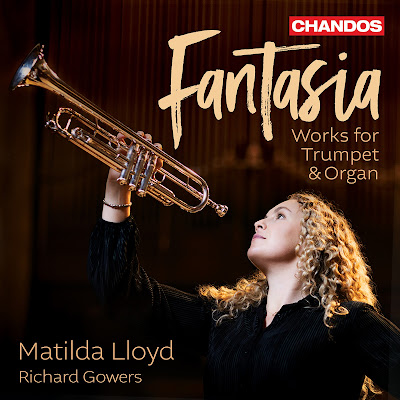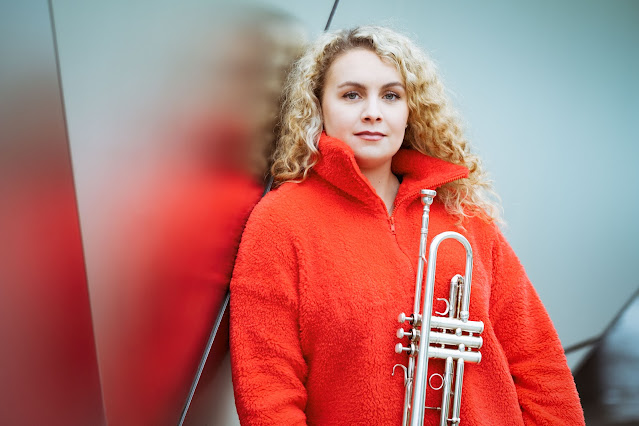 |
| Matilda Lloyd (Photo: Geoffroy Schied) |
When I met up for coffee with Matilda Lloyd last month, she was laden down with five trumpets, ranging from a piccolo trumpet to a flugelhorn, all of which come into play on her new disc Fantasia on Chandos Records, recorded at Waltham Abbey Church earlier this year with organist Richard Gowers. The disc features Baroque music by Bach, Krebs, Martini, and Pachelbel, alongside four premiere recordings of music by Roxanna Panufnik, Richard Barnard, Owain Park, and Deborah Pritchard. However, Matilda explains that the idea for the disc has been in the works for a long time, dating right back to when she played Bach’s Toccata and Fugue in an arrangement for brass quintet while at Junior Guildhall and enjoyed the majestic sound.
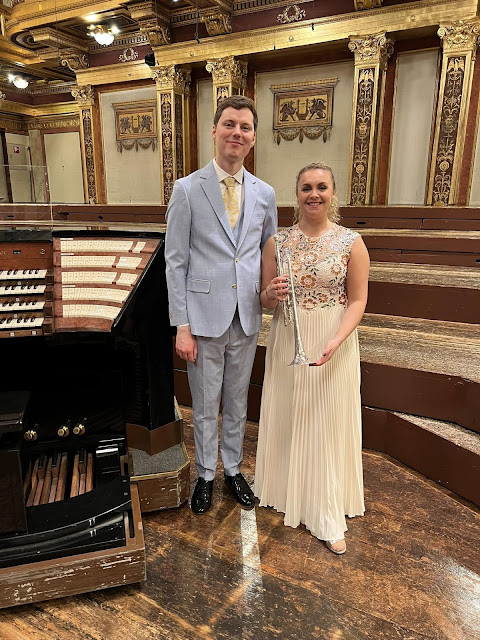 |
| Richard Gowers & Matilda Lloyd at Wiener Musikverein (via Facebook) |
The idea for performing music for trumpet and organ developed with her duo partner, Richard Gowers, who was the organ scholar whilst she was at university. Having exhausted the existing repertoire, they made new arrangements.
They had the idea of expanding the repertoire, effectively developing the legacy of playing Baroque music on a trumpet, which began with the French trumpeter Maurice André (1933-2012), who rose to international prominence in the 1960s and 1970s with a series of recordings of Baroque works on piccolo trumpet.
Matilda and Richard expanded further by contrasting the new arrangements with new pieces.
The four pieces on the new disc are all new commissions, designed to complement the Baroque pieces. The album is called Fantasia, which in the Baroque period implied a work that was lyrical and improvisatory, but Matilda asked the four composers to compose a work inspired by whatever Fantasia meant to them. Each composer took the word ‘Fantasia’ in a different direction with dreams and the borders of sleep, poetry, landscape and stained glass.
Matilda had an existing relationship with each of the four composers. She and Owain Park studied music at Trinity College together. She has known him for over a decade and admired his compositional voice, whilst he was both an organist and a trumpet player. She has recently recorded a collaborative programme with Park and his ensemble, Gesualdo Six, and the disc Radiant Dawn was recently released. His piece for the Fantasia disc, Warm, hazy rain, is inspired by landscape, Park suggests “perhaps gazing out of a train window or reminiscing about a leisurely bicycle ride through warm, misty country lanes.”
Matilda and Deborah Pritchard have a long history, and Matilda recorded Deborah Pritchard’s Seven Halts on the Somme on her first disc, Direct Message on Orchid Classics, in 2018. Matilda describes this as a very evocative work, based on paintings. Deborah Pritchard has synaesthesia and makes connections between music and colours, so that her piece on the Fantasia disc, Light enkindled, is based on stained glass.
Richard Barnard wrote a piece, Aura, for Matilda and Gesualdo Six for their Radiant Dawn disc. For Fantasia, Barnard wrote At the Borders of Sleep which is inspired by Edward Thomas’ poem Lights Out and the way the poem is laid out on the page. Matilda enjoys Barnard’s word-painting in the piece and the way he composes.
Roxana Panufnik is someone whom Matilda has admired for so many years, loving her choral music. Matilda enjoys Panufnik’s lyrically expressive writing, and she wanted to showcase this side of the trumpet. Panufnik’s piece, Echo, uses the flugelhorn.
Looking at both Matilda’s recordings and her concert diary, you can see that she performs quite a bit of contemporary music. When I mention this, she laughs and says that she does play the Haydn and Hummel concertos quite a lot. But as a young artist, she feels that she wants to offer something new, do something different, rather than repeat what others have done. Regarding standard repertoire, she wants to wait until she feels ready to put down her version of pieces. But she also enjoys exploring forgotten repertoire, creating new arrangements and commissioning repertoire.
Whilst there are so many different sides to the instrument, the repertoire does have holes, and she is keen to showcase these different sides of the instrument. She also admits that she is not someone who would be content just to settle; she is always looking for a new challenge and new repertoire. She likes to push herself and her playing, trying to improve and get better, which is why she still practices every day.
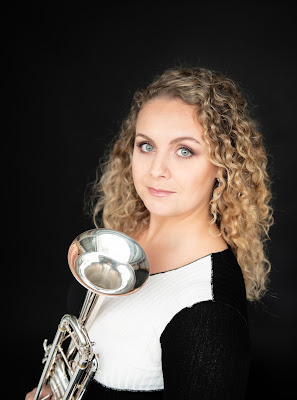 |
| Matilda Lloyd (Photo: Neda Navaee) |
Coming up, she is playing Helen Grime‘s Trumpet Concerto ‘night-sky-blue’ with performances in Meiningen, Vilnius, and with the BBC National Orchestra of Wales, conductor Ilan Volkov, in Swansea. The work was written for her teacher Håkan Hardenberger, and Matilda will only be the second person to play the work. She describes it as virtuosic and expressive. She loves music that tells a story, has a journey and expresses something. The subtitle of Grime’s concerto, ‘night-sky-blue‘, is taken from a poem by Fiona Benson, and Grime’s inspiration came from a book of photographs depicting scenes from the natural world after darkness had fallen.
Matilda’s 2024 album, Resonance on Chandos, featured concertos by Mieczysław Weinberg (1919-1996) and the contemporary German composer Christoph Schönberger, along with music by Rachmaninoff and Goedicke with the London Symphony Orchestra, conductor Lee Reynolds. Schönberger’s concerto, which dates from 2021, Matilda describes as virtuosic as it explores the fanfare aspects of the instrument. She wanted to pair it with the Weinberg as she loves this concerto. Weinberg wrote the piece for the Russian virtuoso Timofey Dokshitser (1921-2005), who gave the first performance in Moscow in 1968. For her, it evokes the music of Shostakovich, and she is sad that he did not write a trumpet concerto. Weinberg’s concerto is a fascinating piece; it is full of quotations from Mahler’s Symphony No. 5, Stravinsky’s Petrushka, Bizet’s Carmen and more, and Weinberg twists the quotations and makes them dark. It was a thrill to play as the writing is so exposed; she feels that it is exciting both to play and to listen to, and it can challenge your technique. When she had a chance to record with the London Symphony Orchestra, she knew she wanted to record Weinberg’s concerto.
Looking ahead, she is putting together a programme for trumpet and string quartet which will blend core repertoire with new repertoire. One composer she is exploring is the Viennese composer Marianna Martines (1744-1814), who had lessons with Haydn and with Hasse. Matilda is transcribing some of the arias from an operetta by Martines. The result, Matilda hopes, will make a more intimate concert experience, more like a 19th-century salon with the trumpet as narrator voice.
On the whole, she is pleased with the balance of repertoire in her schedule, mixing contemporary with better-known works such as the concertos by Haydn, Hummel and the Armenian composer Alexander Arutiunian (1920-2012). She also enjoys playing chamber music, where there is more choice and more freedom over the repertoire.
Matilda is learning the Trumpet Concerto by John Williams, the composer best known for his film music. His concerto was originally written in 1996 for Michael Sachs, the principal trumpet of the Cleveland Orchestra. Matilda calls it a fantastic piece, though it is not much played in Europe. But she also admits that it is not always easy to persuade orchestras to rise to the unusual, and it is a constant negotiation. In Lithuania, where she performs Helen Grime’s concerto, she is performing with the Lithuanian National Symphony Orchestra, conductor Gediminas Gelgotas, as part of a contemporary music week, Gaida Festival, which is the largest and most prominent festival of contemporary music in Lithuania.
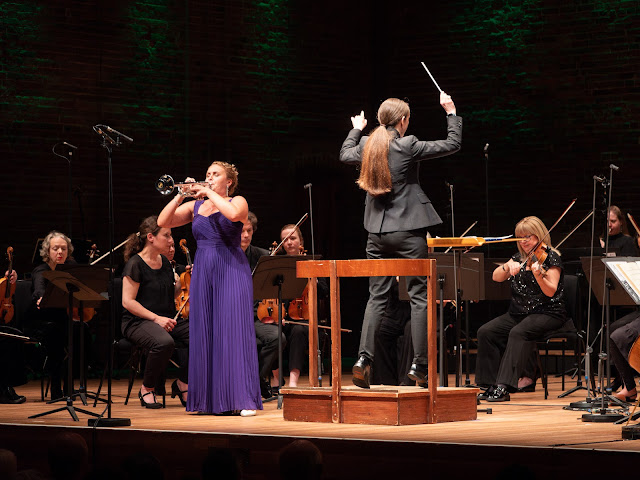 |
| Robin Haigh: LUCK – Matilda Lloyd, Britten Sinfonia, Jessica Cottis – Aldeburgh Festival at Snape Maltings, 2024 (Photo: Angus Cooke) |
With the Ulster Orchestra, conductor Cosette Justo Valdés, she will be giving the Irish premiere of Robin Haigh‘s concerto LUCK, which was written for her and premiered at the Aldeburgh Festival [see Robin Haigh’s article]. She and Robin Haigh first got together a year before the work’s premiere, and the learning was very involved with so much preparation. She comments that it is so difficult to prepare a piece for a long period and then only give one performance. Performing a work for the first time is always a very particular experience. At the Aldeburgh Festival, the stakes were quite high as it was premiered at the concert in 2024, when the 75th edition of the festival recreated the opening night of the first festival in 1948. [see Tony’s review]. She can barely remember that performance, so she is looking forward to doing Haigh’s concerto again. The Ulster Orchestra co-commissioned the work. She calls it groovy and funky, with visceral energy.
Matilda’s father played the trumpet when he was at school, and at the age of eight, she found her father’s old trumpet and made a decent noise on it. Her mother was a piano teacher, and Matilda was already learning the piano, so she started learning the trumpet. Her mother was her accompanist, all the way to the brass final of the BBC Young Musician competition.
Matilda enjoyed competitions; she not only likes a challenge but also likes having a goal, something to work towards. At school, she admits to preferring exams to coursework. Competitions gave her a focus for her practice, and taught her how to prepare a lot of repertoire to a high standard at the same time, a skill which is still useful in her career. When she performed in the BBC Young Musician, she was already principal trumpet of the National Youth Orchestra, but the competition showed her that she enjoyed being a soloist (she had also done other competitions in preparation for the BBC one). This set her on her current path, showing that you don’t have to be an orchestral player. Playing in an orchestra was seen as the natural career path, and the teaching at college was largely tailored to winning jobs in this area. As a soloist, she not only loves the repertoire but also enjoys making her own artistic decisions.
During the 2024/25 season, she was a European Concert Hall Organisation (ECHO) Rising Star with 18 recitals on Europe’s most prestigious stages, including Het Concertgebouw, Amsterdam, the Musikverein, Wien, the Elbphilharmonie, Hamburg and the Philharmonie de Paris. She had to submit four different concert programmes, including one that was unusual/out of the box. For this, she created an interdisciplinary programme involving music inspired by art or poetry. For the art-inspired pieces, they projected the artworks in the venue, and for the poetry-inspired pieces, Matilda recited the poem as well. She feels the interdisciplinary approach helps audiences to see the inspiration behind the music, and they enjoyed good feedback from the programme and performed it at the Elbphiharmonie in Hamburg. Her other three ECHO programmes were for trumpet and piano or trumpet and organ. This latter she performed with Richard Gowers in the Goldener Saal of the Musikverein in Vienna.
She describes it as an amazing tour, something that is unlikely to happen again. It enabled her to explore different cities, including those like Budapest and Stockholm that she had never visited before, and she played in some iconic venues, and she mentions the amazing acoustics in the Kleinersaal of the Concertgebouw in Amsterdam.
Full details of Matilda Lloyd’s forthcoming concerts from her website.
The blog is free, but I’d be delighted if you were to show your appreciation by buying me a coffee.
Elsewhere on this blog
- I Shall Hear In Heaven: Tama Matheson impressively incarnates Beethoven with music alongside the spoken word – music theatre review
- BBC Proms: Classics, bon-bons & an engagingly fresh account of a masterpiece, Nil Venditti conducts BBC NOW – concert review
- Bayreuth Festival: Thorliefur Örn Arnarsson’s interpretation of Tristan und Isolde is a well-planned and thoughtful affair – opera review
- All-consuming: Kateřina Kněžíková’s account of the title role lights up Damiano Michieletto’s overly conceptual production of Janáček’s Káťa Kabanová at Glyndebourne – opera review
- BBC Proms – Arvo Pärt at 90: Estonian Philharmonic Chamber Choir, Tõnu Kaljuste – concert review
- Baltic Tides: piano music by two important Baltic pianist composers, Lūcija Garūta & Ester Mägi makes for a marvellous, compelling disc – record review
- Frederick and his sister: music for Postsdam and Bayreuth created for Frederick the Great and Wilhelmine of Bayreuth – record review
- Passion project that deserves to be enjoyed: Alastair Penman’s The Last Tree – record review
- To honour the women by giving voice to their experience: pianist Deirdre Brenner introduces The Magdalene Songs – interview
- Satisfying all round: Opera Holland Park’s revival of its 2018 production of Verdi’s La traviata showcases a trio of fine principals – opera review
- Home



